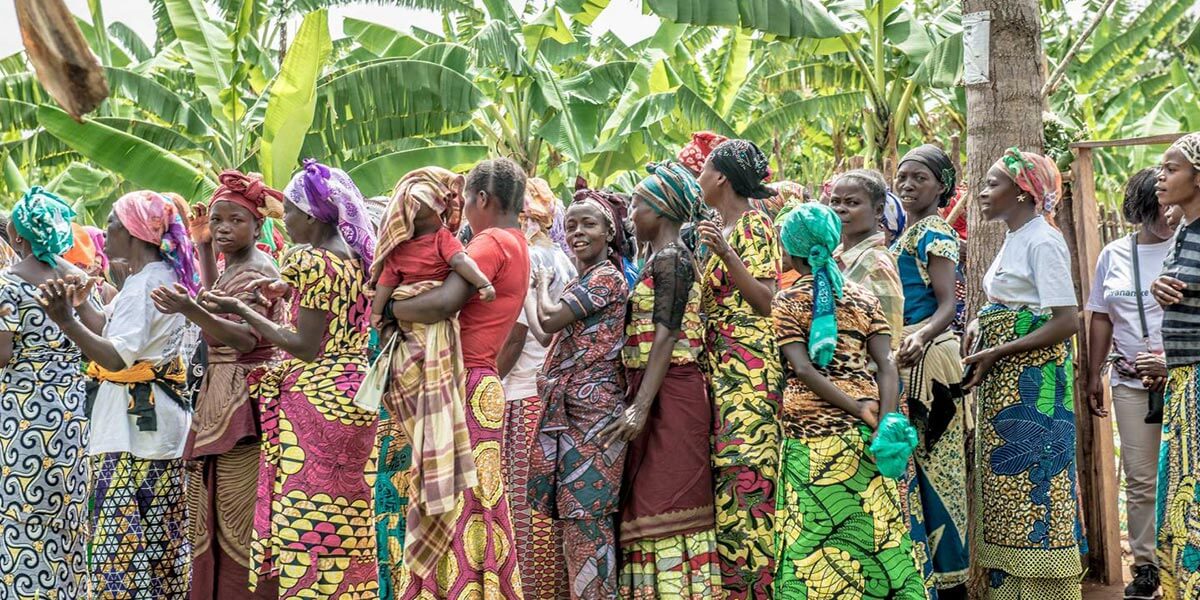Each year, hundreds of millions of women and girls around the world experience some form of violence – and most do not report the incidents or seek help. COVID-19 has exacerbated this trend, with lockdowns, school closures, and economic insecurity intensifying domestic violence and leaving women and girls poorer and more vulnerable to different forms of exploitation and abuse.
In honor of the United Nation’s 16 Days of Activism against Gender-based Violence – from November 25 to December 10, 2020 – we are celebrating six innovators with bold solutions in the global fight to end violence against women and girls. These innovators have received funding through two innovation challenges under our USAID Catalyst project.
Empowering Women in Venezuela’s Migrant Communities
Funded by USAID and the Inter-American Development Bank, the BetterTogether Challenge crowdsources, funds, and scales forward-thinking solutions to support Venezuelans and host communities affected by the regional migration crisis. Three BetterTogether Challenge winners are advancing new solutions to protect and empower Venezuelan migrant women:
1. The WELCOME Project by Democracy International
Democracy International has introduced the Women Exercising Leadership for Cohesion and Meaningful Empowerment (WELCOME) project in Trinidad and Tobago, where Venezuelan migrant women disproportionately face harassment and xenophobia. The program will adapt and test a set of proven, low-cost interventions to increase awareness of harassment and xenophobia and encourage communities to defend women and speak out against harassment.
2. The Safe to Learn and Thrive Together Project by the International Rescue Committee
In Colombia, the arrival of more than 300,000 Venezuelan migrant children has strained the country’s education system and other social services. The Safe to Learn and Thrive Together project by the International Rescue Committee (IRC) works to support and protect Venezuelan migrant children in school and at home. Among a suite of other school- and community-based services, the project promotes safety at home through WhatsApp support groups and online resources for parents. These online tools allow the project to connect with and support caregivers even during the COVID-19 pandemic.
3. The Loop Project by Nanas & Amas
In Peru, Nanas & Amas has created a mobile app, called Loop, to connect Venezuelan migrant women in Peru to vetted employment opportunities that ensure fair pay, security, and the opportunity to determine their own employment terms. The Loop initiative will also support Venezuelan women with personal development training to help them succeed professionally in their host communities, and it provides local financial information with strategies to start saving, to help women pursue their educational and professional aspirations.
Addressing Gender-Based Violence in Environmental Programing
From our USAID-funded Resilient, Inclusive, and Sustainable Environments (RISE) Challenge, we’re highlighting three winners working to prevent gender-based violence (GBV) in global environmental programs.
RISE incentivizes partnerships between environmental organizations, local communities, indigenous peoples organizations, and gender and GBV experts who can help bridge knowledge gaps and work to build an evidence base of effective GBV interventions.
4. Creative Capacity Building to Address GBV in the Artisanal and Small-Scale Mining Sector by Alliance for Responsible Mining
The Alliance for Responsible Mining has partnered with MIT D-Lab to introduce GBV prevention into existing efforts to increase socio-economic opportunities for women miners, and reduce the environmental impacts of mining in the Antioquia region of Colombia. With RISE funding, the project will use a proven and innovative movement-building approach to address GBV in mining. Through this approach, ARM will create safe spaces for women to share their GBV experiences and collectively build solutions. The project will also guide women on best practices in organizing themselves into associations and addressing GBV in their communities.
5. Securing Land Rights and Ending Gender Exclusion Project by Trócaire
In eastern Uganda, approximately 80 percent of women report experiencing violence when claiming their land rights. Trócaire, in partnership with Land Equity Movement of Uganda and Soroti Catholic Diocese Integrated Development Organization, are integrating SASA! Faith – a proven methodology for addressing the power imbalances between men and women and preventing GBV – into efforts to strengthen women’s land tenure and property rights in Uganda.
6. Rising Up! Project by Women for Women International
In the Democratic Republic of Congo (DRC), women struggle to attain secure land ownership, and incidences of gender-based violence are high. Women for Women International (WfWI) has partnered with Innovation and Training for Development and Peace to combine their proven gender-based violence interventions with the promotion of women’s land rights and access. This project will engage men in shifting social norms, train change agents to prevent violence, and expand women’s land rights to increase their economic independence and security.

